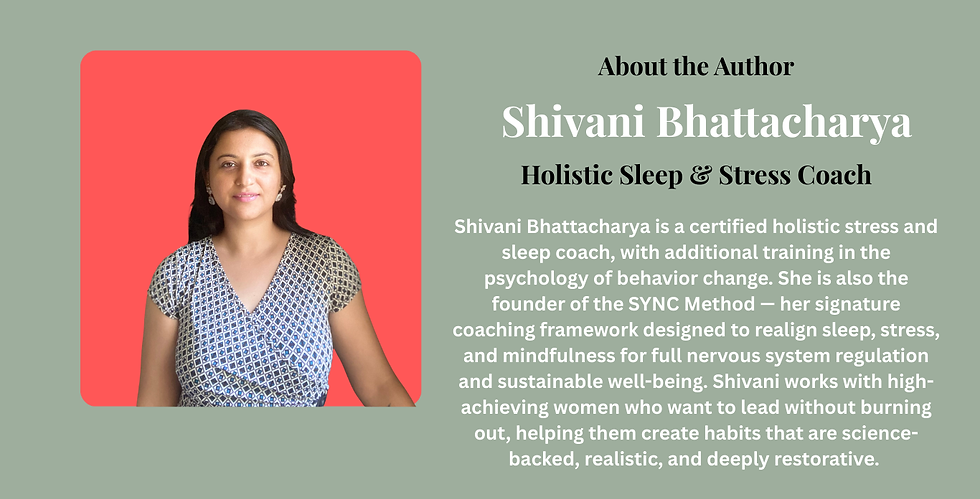How Sleep Impacts Your Gut Health and Ways to Improve Both By Shivani Bhattacharya – Online Sleep Coach
- Shivani Bhattacharya
- Mar 3, 2025
- 3 min read
Updated: Jun 4, 2025

💡 Why High-Achieving Women Struggle with Sleep & Burnout
If you’re a woman in leadership, chances are you’ve mastered the art of juggling deadlines, handling high-pressure decisions, and balancing work-life demands. But at what cost?
Your mind races at 3 AM, replaying meetings, emails, and unfinished to-do lists. You wake up exhausted, surviving on coffee and adrenaline. No matter how much you try to “relax,” you still feel wired and restless.
Sound familiar? Burnout and sleep deprivation are two sides of the same coin. And if you don’t fix sleep, you won’t truly recover from burnout.
That’s where sleep coaching comes in—because quality sleep isn’t just about rest, it’s about resilience, recovery, and performance.
The Science Behind Sleep & Stress: Why Your Brain Won’t Switch Off

Here’s the reality: Burnout isn’t just mental exhaustion—it’s a full-body shutdown. When stress is constant, your nervous system gets stuck in survival mode, keeping your cortisol (stress hormone) levels high and your sleep patterns completely out of sync.
High stress = High cortisol → Blocks melatonin (your sleep hormone). Poor sleep = Higher anxiety → Leads to more stress the next day. Chronic exhaustion = Impaired decision-making, irritability, and fatigue.
This vicious cycle is exactly why so many women leaders struggle with sleep. Even when they are physically exhausted, their mind refuses to shut down.
This is where my approach as an online sleep coach comes in—helping high-achieving women rewire their sleep patterns using CBT-I (Cognitive Behavioral Therapy for Insomnia) combined with my unique coaching framework.
Sleep Coaching for Women Leaders: The Missing Link to Burnout Recovery

Most people think fixing sleep is about: Taking melatonin. Sleeping in on weekends. Trying to go to bed earlier.
But none of these work if your body is still stuck in stress mode.
As someone who has worked with driven, ambitious women who thrive under pressure, I know that you don’t need another generic “sleep hygiene” checklist. You need an approach that fits your reality—one that helps you:
Switch off your racing mind at night without forcing it. Wake up feeling refreshed—not exhausted from another restless night. Increase energy levels and mental clarity—without relying on caffeine.
This is what I focus on in sleep coaching for women leaders—a structured, science-backed approach to break the burnout cycle through better sleep.
🔄 The Sleep-Gut Connection: How Poor Sleep Impacts Your Body
Most people don’t realize that bad sleep doesn’t just make you tired—it disrupts your gut health too.
When you’re sleep-deprived, your body produces: More ghrelin (the hunger hormone) → So you crave more sugary, processed foods. Less leptin (the satiety hormone) → So you never feel fully satisfied. Higher inflammation levels → Which weakens your stress resilience.
That’s why when you’re exhausted, you reach for caffeine and carbs all day long. It’s a biological response, not just a bad habit.
And here’s the kicker—gut health affects sleep, too. Your gut produces 90% of your serotonin (which regulates mood and sleep). If your gut is inflamed, your sleep will always suffer.
This is why burnout recovery must include sleep coaching. Fixing sleep doesn’t just help you feel rested—it helps you reset your entire body, from stress hormones to gut health to energy levels.
The True Cost of Sleep Deprivation for Women Leaders

The biggest myth? That pushing through exhaustion makes you a stronger leader.
In reality, burnout silently destroys leadership performance. Studies show that sleep-deprived professionals experience: 60% slower problem-solving skills. Reduced emotional intelligence & decision-making. Higher levels of irritability, reactivity, and stress sensitivity.
And let’s not even get started on how chronic stress impacts long-term health—weight gain, hormonal imbalances, anxiety, and even cardiovascular issues.
Fixing sleep is not a luxury—it’s a non-negotiable for high performance.








Comments